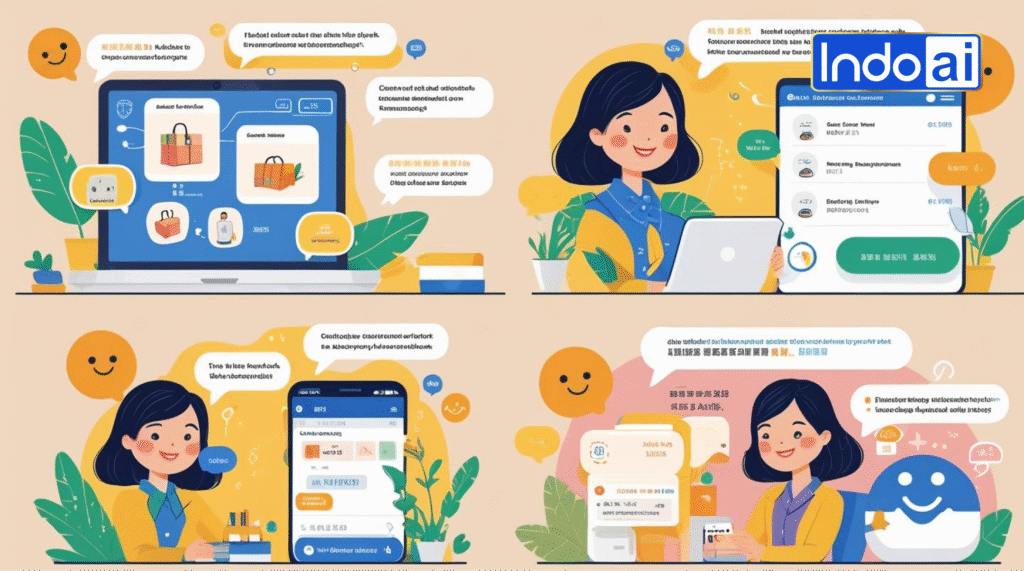In recent years, the use of artificial intelligence (AI) chatbots has become increasingly popular in the e-commerce industry. AI chatbots are automated systems that use natural language processing (NLP) and machine learning to communicate with customers in a human-like manner. They are designed to provide quick and efficient customer service, answer queries, and even make recommendations.

The Role Of AI Chatbots In E-Commerce
24/7 Customer Service
One of the main advantages of AI chatbots in e-commerce is their ability to provide 24/7 customer service.
Unlike human customer service representatives who have limited working hours, chatbots are always available to provide assistance. This means that customers can get their queries resolved at any time of the day, without having to wait for business hours.
Personalized Shopping Experience
AI chatbots can also provide a personalized shopping experience to customers.
They use machine learning algorithms to analyze a customer’s past purchases and browsing history to make personalized product recommendations. This not only enhances the customer experience but also increases the chances of a sale.
Quick and Efficient Service
AI chatbots are designed to provide quick and efficient service to customers. They can answer queries, provide product information, and even process orders. This eliminates the need for customers to wait in long queues or navigate complex phone menus.
Cost-Effective
AI chatbots are cost-effective compared to human customer service representatives.
They can handle multiple queries at the same time, which reduces the need for a large customer service team. This results in cost savings for e-commerce companies.
Improved Customer Satisfaction
AI chatbots can improve customer satisfaction by providing quick and efficient service.
Customers are more likely to return to an e-commerce site if they have had a positive experience with a chatbot. This can lead to increased sales and customer loyalty.
Handling Customer Feedback
AI chatbots can also handle customer feedback. They can ask customers for feedback after a purchase and provide quick and efficient responses.
This not only helps e-commerce companies to improve their products and services but also shows customers that their feedback is valued.
Multi-Language Support
AI chatbots can provide support in multiple languages. This is particularly useful for e-commerce companies that operate in multiple countries.
Chatbots can communicate with customers in their native language, which improves the customer experience and increases the chances of a sale.
Streamlining Customer Service
AI chatbots can help to streamline customer service by automating the handling of common queries and requests.
By using AI chatbots to handle routine tasks, e-commerce companies can improve the efficiency of their customer service operations and reduce the workload on their staff.
Enhancing Brand Image
AI chatbots can enhance the brand image of e-commerce companies by providing a modern and innovative customer service experience.
Customers who interact with chatbots may be more likely to see the company as cutting-edge and forward-thinking, which can help to attract and retain customers. Additionally, by providing quick and efficient service, chatbots can help to build trust and loyalty with customers.
Upselling and Cross-Selling
AI chatbots can be used to upsell and cross-sell products to customers.
By analyzing a customer’s purchase history and browsing behavior, chatbots can make personalized product recommendations and suggest complementary items. This can increase the average order value and drive revenue growth for e-commerce companies.
Gathering Customer Data
AI chatbots can also be used to gather valuable customer data.
By asking questions and engaging in conversation with customers, chatbots can collect information about customer preferences, interests, and behavior.
This data can be used to improve the accuracy of product recommendations, target marketing campaigns, and inform product development.
Integration with Other Systems
AI chatbots can be integrated with other systems and applications to provide a seamless customer experience.
For example, chatbots can be integrated with inventory management systems to provide real-time product availability information. They can also be integrated with payment gateways to process orders and provide order tracking information.
Improving Accessibility
AI chatbots can improve the accessibility of e-commerce sites for customers with disabilities.
Chatbots can provide a text-based interface that is easier to use for customers who are visually impaired or have other disabilities.
Additionally, chatbots can provide support in multiple languages, which can be particularly beneficial for customers who speak languages other than English.
Continuous Improvement
AI chatbots can be continuously improved over time through machine learning and data analysis.
As chatbots interact with more customers and collect more data, they can become more sophisticated and provide more accurate and relevant recommendations.
This continuous improvement can help to keep customers engaged and satisfied, and drive long-term revenue growth for e-commerce companies.
Overall, the role of AI chatbots in e-commerce is multifaceted and continually evolving. By providing personalized service, streamlining customer service, and improving the accessibility and accuracy of e-commerce sites, chatbots can help to enhance the customer experience and drive growth for e-commerce companies.